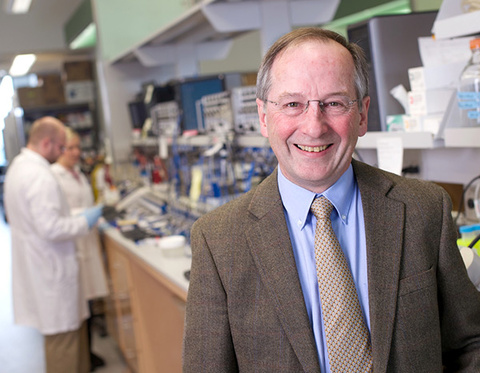The 2018 Warren Alpert Foundation Prize has been awarded to five scientists, including the University of Iowa’s Michael Welsh, MD, for transformative discoveries in the fields of genetics, physiology, pulmonology and pharmacology that led to the development of life-altering precision-targeted treatments for the devastating multi-organ disease cystic fibrosis (CF).
The Warren Alpert Foundation, in association with Harvard Medical School, honors trailblazing scientists whose work has improved the understanding, prevention, treatment, or cure of human disease.
The 2018 Warren Alpert Foundation Prize recipients are:
- Francis Collins, Director, National Institutes of Health
- Paul Negulescu, Senior Vice President for Research, Vertex Pharmaceuticals
- Bonnie Ramsey, Vice Chair and Endowed Professor of Pediatrics, University of Washington School of Medicine, director, Center for Clinical and Translational Research, Seattle Children’s Research Institute
- Lap-Chee Tsui, founding president, Academy of Sciences, Hong Kong, professor emeritus, University of Toronto
- Michael Welsh, Professor of Internal Medicine - Pulmonary, Critical Care, and Occupational Medicine, University of Iowa; Investigator, Howard Hughes Medical Institute
The honorees will be recognized at a symposium on Oct. 4 at Harvard Medical School.

“I am deeply honored to be recognized with Lap-Chee Tsui, Francis Collins, Bonnie Ramsey, and Paul Negulescu,” said Welsh. “In accepting this award, I acknowledge so many other people who contributed: talented students and trainees, my tireless and innovative assistants, my cherished colleagues, and my collaborator, Alan Smith and his team at Genzyme. I thank the University of Iowa, the Howard Hughes Medical Institute, the National Institutes of Health, and the Cystic Fibrosis Foundation for their support. Most of all, I thank my family, whose love and support made everything possible.”
Brooks Jackson, MD, vice president for medical affairs and dean of the UI Roy J. and Lucille A. Carver College of Medicine, said the recognition was well-deserved. “The Alpert Prize has honored some of the most transformative scientific achievements of our time. Throughout his career, Dr. Welsh has remained steadfast in his pursuit of answers to the fundamental questions underlying cystic fibrosis disease. His work, together with his colleagues and collaborators, has dramatically changed the lives of people with CF.”
E. Dale Abel, MD, PhD, chair of the department of internal medicine, noted how fitting it is for Welsh to be recognized for this collaborative effort: “Mike’s scientific acumen is matched only by his generosity and ability to create highly collaborative teams that pushed his scientific discoveries forward. His inclusive approach is one of the hallmarks of his success.”
Decades of research make Welsh a national leader in the fight against cystic fibrosis

Three decades of delving into the mysteries of cystic fibrosis (CF) began with simple, fundamental curiosity. “I just wanted to understand how the airway worked,” says University of Iowa pulmonologist Michael Welsh, MD. In particular, he wanted to know how salt ions move across airways—a biological process that helps lungs defend against infection or damage from inhaled pathogens and particles. Knowing that CF increases susceptibility to lung infection, Welsh suspected that abnormal ion transport could play a role in CF disease.
Working with colleagues from the University of California, San Francisco, in the mid-1980s, Welsh first demonstrated that CF disrupts chloride ion transport across airway epithelium. This significant finding preceded the discovery of the cystic fibrosis transmembrane conductance regulator (CFTR) gene by four years. Once the gene was revealed, Welsh and his colleagues set off to decipher the molecular pathogenesis of the disease. First, they showed that the function of the CFTR protein was to act as a portal for chloride ions, and later they discovered that the protein was also required for movement of bicarbonate ions.
CF affects some 75,000 people in the United States and Europe. Once fatal in childhood, life expectancy has increased to early 40s, thanks in part to discoveries made by the five award recipients. New therapies repair the underlying protein malfunction that fuels disease development, stave off further organ damage, and boost survival.
Elucidating the genetic defect behind the disease, defining the molecular mechanisms that fuel CF development and designing precision-targeted therapies are the collective work of multiple scientists over several decades. However, the five award recipients made the key discoveries that propelled this quest forward.
The hallmark of CF is a genetic mutation that impairs cells ability to transport chloride, leading to the buildup of sticky mucus in the lungs and other organs and causing a constellation of symptoms, most notably recurrent lung infections and progressive scarring and loss of lung function, as well as a range of pancreatic, liver, and other gastro-intestinal problems.
Until 2012, treatment for CF remained purely symptomatic, focused on mitigating the effects of the disease. In 2012, however, following decades of painstaking work in genetics, physiology, and biochemistry, the FDA approved the first treatment that, in fact, restores the cells’ ability to transport chloride. That achievement was the cumulative result of work done by the five award recipients and their teams. Two dual-drug treatments followed, and triple-action therapies are currently in development as a result of these initial discoveries.
The pivotal CF discoveries honored this year include:
- Identification of the gene responsible for CF and its cardinal sign—cells’ inability to transport chloride in and out.
- Discovery of how mutations in the CFTR gene and its product—CFTR protein—precipitate disease development, its key symptoms and related downstream complications.
- Development of precision-targeted small-molecule treatments that correct the activity of the mutated protein.
- Design, oversight, and execution of clinical trials that led to the FDA approval of the first two precision-targeted treatments for CF.
The foundational work was conducted by Tsui and Collins and their teams, whose research led to the discovery of the cystic fibrosis gene, elucidated its molecular structure and function, and pinpointed its location. In doing so, they provided an entry point to understanding the basic defect that fuels a complex disease affecting multiple organs and organ systems.
Welsh led the team that made key discoveries toward elucidating the role of the product of this gene, the CFTR protein, as the chemical transporter that allows chloride to move in and out of cells. They showed how mutations in the gene and its product cause cells to malfunction and fuel disease development. These insights provided the rationale for the subsequent quest toward targeted therapies to repair the function of the CFTR protein.
Building on these key discoveries, a team of scientists at Vertex, led by Negulescu, initiated research in 1998 into compounds that modulate the function of the CFTR protein. The research led to the development in 2012 of the first compound that corrects the underlying protein defect responsible for disease symptoms. This restored cells’ ability to transport chloride and ushered in a new era of CF treatment, sparking the development of combination-drug therapies.
Ramsey was the architect of the seminal clinical trials that led to the approval of the first and subsequent small-molecule treatments in current use and was critical to ensuring the therapies’ translation from lab to clinic.
Additionally, the Cystic Fibrosis Foundation, a research and advocacy group, provided catalytic support in the early-stage research that eventually led to the development of today’s small-molecule therapies.
“The work of the five scientists we are honoring today is a triumph of modern medicine,” said Bevin Kaplan, director of the Warren Alpert Foundation. “We are humbled by the passion, dedication, and acumen of a truly remarkable group of individuals whose achievements have touched the lives of patients and families across the world.”
The Warren Alpert Foundation
Each year the Warren Alpert Foundation receives between 30 and 50 nominations from scientific leaders worldwide. Prize recipients are selected by the foundation’s scientific advisory board, which is composed of distinguished biomedical scientists and chaired by the dean of Harvard Medical School.
Warren Alpert (1920-2007), a native of Chelsea, Mass., established the prize in 1987 after reading about the development of a vaccine for hepatitis B. The inaugural recipient of the award was Kenneth Murray of the University of Edinburgh, who designed the hepatitis B vaccine. To award subsequent prizes, Alpert asked Daniel Tosteson (1925-2009), then dean of Harvard Medical School, to convene a panel of experts to identify scientists from around the world whose research has had a direct impact on the treatment of disease.
The Warren Alpert Foundation Prize is given internationally. To date, the foundation has awarded more than $4 million to 64 scientists. Since the award’s inception, eight honorees have also received a Nobel Prize.